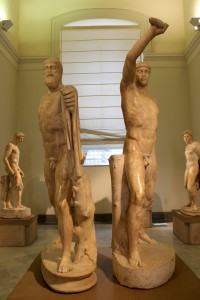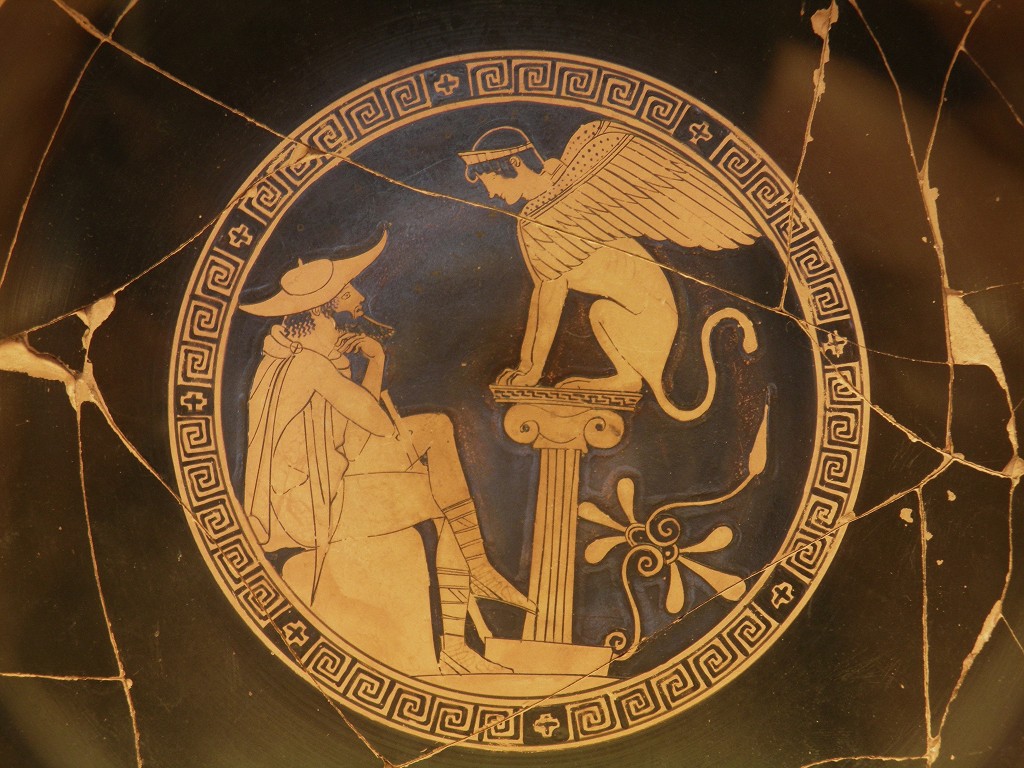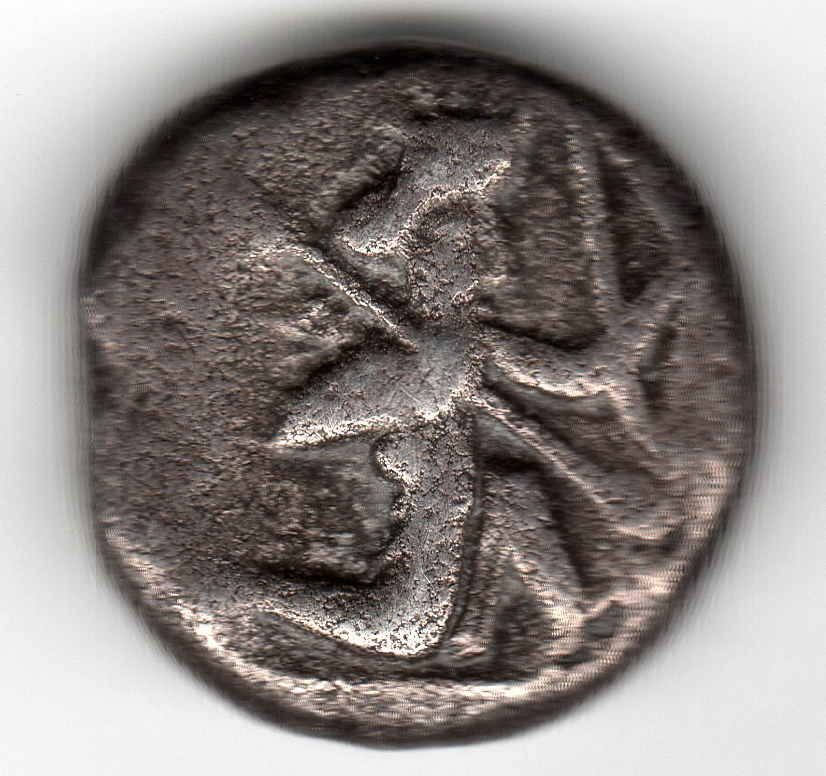A guest post by Sarah Scott
This month I’m inviting everyone to explore the word turannos [τύραννος], which is defined in the Core Vocabulary: “turannos, plural turannoi (Lydian word for ‘king’): ‘king’ (from the viewpoint of most Greek dynasties); ‘unconstitutional ruler’ (from the viewpoint of Greek democracy).” A more detailed explanation is given in H24H[1][1] 19§6, where the focus is on Oedipus in the Sophocles drama Oedipus Tyrannus:
In this book, the last time I used the word tyrant for purposes of my own argumentation was in Hour 13§47, which was the last paragraph of that hour. Back then, I was interpreting a passage in Theognis (1081–1082b), Hour 13 Text L, where the speaker was referring to a hypothetical dictator of a hypothetical city-state. In that context, I said that such a dictator was the equivalent of a tyrant. This word tyrant comes from the Greek noun turannos, which has a long and complicated history that I studied in great detail in other work. [1 = ref to GN footnote 1] I will now attempt a formulation that summarizes all that work, focusing here on what the word turannos meant in the political context of Athens in the second half of the fifth century BCE, the era of Sophocles:
So I wanted to find other places where the word is used, to see whether it was being used in the sense of an unconstitutional ruler or tyrant, or simply to refer to a king, not only by finding places where the word is used in the texts but by looking at the surrounding context for such metaphors or for words related to pollution or hubris.
The first example is from Herodotus:
 …the Attic[2] was repressed and divided by Peisistratos son of Hippokrates, who at that time was turannos of the Athenians. When Hippokrates as a private citizen was observing [verb of theōriā] the Olympics, a great portent appeared to him: as he was performing the sacrifices, the cauldrons standing full of meat and water boiled up and started to overflow without fire. Khilon the Lacedaemonian was there and saw the portent, and advised Hippokrates: first, not to bring a wife of child-bearing years into his household; second, if he had a wife, to divorce her; and if he had a son, to disown him. Khilon gave this advice [par-aineîn], but Hippokrates refused to be persuaded by it. Afterwards was born to him Peisistratos, the one who aimed at the tyranny and instituted a third faction [stasis], when the coast people and the plain people of the Athenians were at strife [= verb of stasis].
…the Attic[2] was repressed and divided by Peisistratos son of Hippokrates, who at that time was turannos of the Athenians. When Hippokrates as a private citizen was observing [verb of theōriā] the Olympics, a great portent appeared to him: as he was performing the sacrifices, the cauldrons standing full of meat and water boiled up and started to overflow without fire. Khilon the Lacedaemonian was there and saw the portent, and advised Hippokrates: first, not to bring a wife of child-bearing years into his household; second, if he had a wife, to divorce her; and if he had a son, to disown him. Khilon gave this advice [par-aineîn], but Hippokrates refused to be persuaded by it. Afterwards was born to him Peisistratos, the one who aimed at the tyranny and instituted a third faction [stasis], when the coast people and the plain people of the Athenians were at strife [= verb of stasis].
….Peisistratos collected partisans [= members of a stasis], claiming to be chief of the hill people, then contrived as follows: he wounded himself and his mules and then drove his team into the agorā as if escaping from his personal enemies [ekhthroi], who wished to kill him as he rode into the country. He asked for a guard from the people [dēmos], since he had gained a good reputation in the expedition against Megara by capturing Nisaia and performing other great deeds. The dēmos of the Athenians was deceived and they ordained that he select men from the townspeople, who became not the spear-bearers Herodotus footnote [14] of Peisistratos but his club-bearers, for they followed behind him holding wooden clubs.[15] They set in motion a revolution, with Peisistratos as leader, and took possession of the acropolis. Then Peisistratos ruled the Athenians without disturbing the existing tīmai or changing the laws [thesmia]. He governed the polis according to the established ways, making-order [= verb of kosmos] for it in a good manner.
(Herodotus Histories 1.59[2])
This seems to me rather ambivalent: Peisistratos becomes ruler through a deception, and yet he seems to respect the local customs and keeping good order: no signs at that point of pollution. However, he is driven out, but later goes on to regain the tyranny and marries the daughter of Megakles, of the lineage of the Alkmaionidai. Herodotus notes:
Since he already had grown-up sons and the Alkmaionidai were said to be under a curse, he was unwilling to have children from his new bride and had sex with her in an unaccustomed [= contrary to nomos] manner.
(Herodotus Histories 1.60)
This language describing his behavior seems to indicate aspects of hubris: enforcing sterility, and acting contrary to customary laws. If you read the whole story, what else can you find about him that might help to define what kind of turannos he is?
In Oedipus at Colonus, Ismene describes the power struggle back home at Thebes:
At first it was their decision that the throne should be left to Creon, and the city spared pollution, when they thought calmly about the ancient blight on our family, 370 and how it has clung to your unfortunate house. But now, moved by some god and by an erring phrēn, an evil strife [eris] has seized them—thrice-deluded!—to grasp at rule and the power of a turannos. And the younger son has stripped the elder, Polyneikes, of the throne, 375 and has driven him from his fatherland. But he, as the widespread rumor says among us, has gone to the valley of Argos as an exile, and is taking to himself a novel kinship, and warriors for his philoi, intending that he shall soon get hold of the Kadmeian land with tīmē, 380 or mount to the sky.
Polyneikes asks Oedipus for help:
I go forth to punish my brother, 1330 who has expelled me and robbed me of my fatherland. For if anything trustworthy comes from oracles, they said that whomever you join in alliance will have victorious power [kratos]. Then, by the streams of water and gods of our race, I ask you to listen and to yield. 1335 I am a beggar and a xenos, as you are yourself; by paying court to others both you and I have an abode [oikos], obtaining by lot the same fate [daimōn]. But he is turannos at home—wretched me!—and in his luxuriance [habrosunē] laughs at you and me alike.
(Sophocles Oedipus at Colonus 1329–1339, Sourcebook)
From the perspective of Polyneikes his brother has seized power; and in the same play Creon, despite, as he claims, having “a mandate from all our people” which sounds democratic enough, resorts to underhand actions to support his own cause. It is left to Theseus to resolve the situation, so it might be interesting to look at the way he is described in contrast to the Thebans.
Finally I wonder when and why the word entered the language since it derives from a Lydian word. It does not appear in the Homeric epics or Hesiod, although it does crop up in the Homeric Hymn 8:
Ἆρες ὑπερμενέτα, βρισάρματε, χρυσεοπήληξ,
ὀβριμόθυμε, φέρασπι, πολισσόε, χαλκοκορυστά,
καρτερόχειρ, ἀμόγητε, δορισθενές, ἕρκος Ὀλύμπου,
Νίκης εὐπολέμοιο πάτερ, συναρωγὲ Θέμιστος,
ἀντιβίοισι τύραννε, δικαιοτάτων ἀγὲ φωτῶν, 5
ἠνορέης σκηπτοῦχε, πυραυγέα κύκλον ἑλίσσων
αἰθέρος ἑπταπόροις ἐνὶ τείρεσιν, ἔνθα σε πῶλοι
ζαφλεγέες τριτάτης ὑπὲρ ἄντυγος αἰὲν ἔχουσι:[3]
Ares, exceeding in strength, chariot-rider, golden-helmed, doughty in heart, shield-bearer, Saviour of cities, harnessed in bronze, strong of arm, unwearying, mighty with the spear, O defence of Olympus, father of warlike Victory, ally of Themis, |5 stern governor of the rebellious, leader of righteous men, sceptred King of manliness, who whirl your fiery sphere among the planets in their sevenfold courses through the aether wherein your blazing steeds ever bear you above the third firmament of heaven;
(Hymn 8 to Ares translated by Hugh G. Evelyn-White, on Perseus)
I hope you will join me in the forum to find other turannoi and other situations that indicate whether they are simply rulers or have associations with those indicators of pollution or hubris. And how would you illustrate the word?
References
[1] H24H: Nagy, Gregory. 2013. The Ancient Greek Hero in 24 Hours. Cambridge, MA: Harvard University Press, 2013.
Footnote [1] in the H24H passage quoted refers to Nagy, Gregory. 1990a. Pindar’s Homer: The Lyric Possession of an Epic Past. Baltimore.
[2] Sourcebook: The Ancient Greek Hero in 24 Hours Sourcebook of Original Greek Texts Translated into English, Gregory Nagy, General Editor.
Footnote [13] in the Herodotus passage quoted says: “The adjective ‘Attic’ and the place-name ‘Attica’ refer to the territory of Athens.”
Footnote [14] in the Herodotus passage quoted says: “The usual word for bodyguards.”
Footnote [15] in the Herodotus passage quoted says: “The hero Hēraklēs was traditionally pictured as brandishing a wooden club.”
[3] Greek text from Perseus
Image credits
Carole Raddato: Oedipus and the Sphinx of Thebes, Creative Commons CC BY-SA 2.0
Classical Numismatic Group, Inc.: Lydian coin, uncertain king, early 6th century BCE CC BY-SA 3.0
Miguel Hermoso Cuesta (Own work): Tiranicidas via Wikimedia Commons CC BY-SA 3.0 [‘Tyrannicides” = Harmodius and Aristogeiton, who killed the tyrant Hipparchus]
dynamosquito: Achemenid Siglos (front side only shown here) CC BY-SA 2.0
___
Sarah Scott has a degree in Language from the University of York where she specialized in philology, and has worked as an editor, technical author, and documentation manager. She is the Associate Producer for the HeroesX project, and one of the Executive Editors of the HeroesX Sourcebook. She is an active participant and member of the editorial team in Hour 25, with a particular interest in content development, document management, word studies, language learning, comparative linguistics, and digital humanities.


